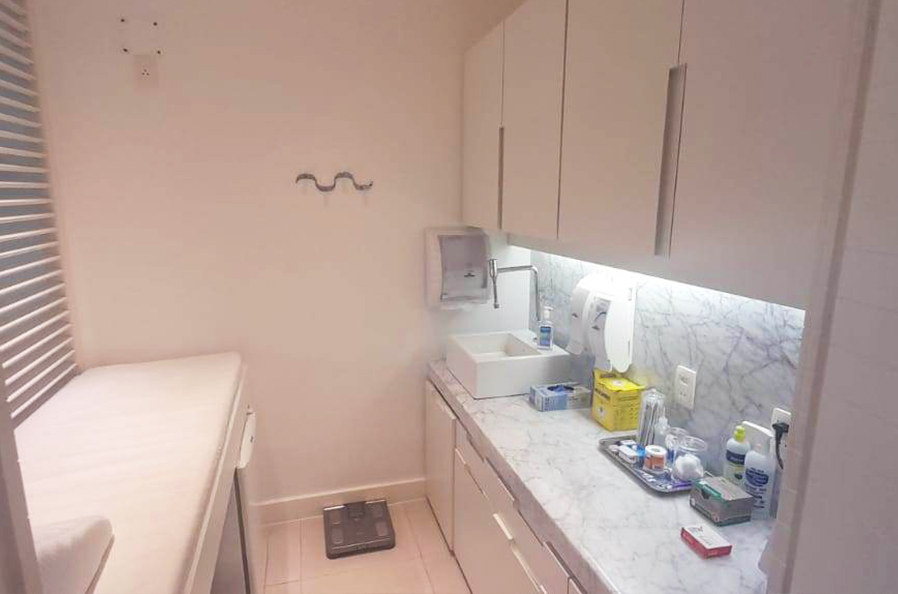
Head of the department of Heart Failure and Heart Transplant Center at Hospital São Lucas Copacabana, part of the DASA Network. Graduated from UERJ, completed residencies at Santa Casa da Misericórdia and Hospital Pró-Cardíaco. Holds a specialization in Advanced Heart Failure, Heart Transplant, Cardiomyopathies and Nuclear Cardiology from the University of Toronto, at the Toronto General Hospital.
Subspecialties: Internal Medicine, Cardiology: Heart Failure, Cardioncology, Cardiomyopathies, Transplantation.
Complementary exams: Cardiopulmonary Exercise Test, Myocardial Scintigraphy, Bioimpedance, Electrocardiogram.
The cardiologist is the medical professional responsible for diagnosing and treating heart pathologies and promoting heart and vascular health.
A consultation with a cardiologist is crucial when the first symptoms of heart problems arise, such as chest pain, shortness of breath, palpitations and persistent fatigue. This consultation aims to evaluate the patient’s heart health, diagnose any existing or potential heart issues, and recommend appropriate treatments or preventive measures. It involves an in-depth assessment by a professional specialized in heart-related conditions.
Routine monitoring and preventive care with a cardiologist should be conducted annually. This is especially important for men over 45 and women over 50, even in the absence of any history of heart problems. Athletes and individuals who frequently engage in physical exercises should also undergo preventive monitoring. For patients with a family history of heart diseases, it’s important to start monitoring earlier, at 30 years for men and 40 years for women.
Overall, a cardiology consultation aims to provide a comprehensive evaluation of heart health, offer guidance on managing heart-related conditions, and promote cardiovascular wellness through preventive strategies tailored to the individual patient.
Pre-operative evaluation refers to a comprehensive assessment performed by healthcare professionals before a surgical procedure. Its main goal is to ensure the patient is in optimal condition for surgery, to minimize risks and complications during and after the operation. involves a thorough assessment of the patient.
The patient will be evaluated based on their medical history, physical examinaation, laboratory tests, imaging studies, previous surgeries, family history, pre-existing conditions, medications in use, allergies, potential previous complications. With this in hands, the doctor will be able to evalute the overall risk associated with the procedure´s complexity for the individual patient, as well as the risks related to cardiovascular possible complications. Additional tests might be required based on the physician´s assessment.
The pre-operative evaluation allows medical teams to identify and address any underlying health issues that could affect the surgical outcome. It also serves as an opportunity for patients to ask questions, discuss concerns, and receive guidance on preparing for the surgery, such as fasting requirements, medication adjustments, and post-operative care instructions.
Cardioncology, also known as cardio-oncology, is a specialized field that focuses on the cardiovascular health of patients undergoing cancer treatment. A cardioncology consultation involves an evaluation by a team of healthcare professionals, typically including cardiologists and oncologists, to assess and manage potential heart-related complications associated with cancer treatments, enabling early treatment and minimizing cardiovascular problems, including preventing heart failure in patients.
The primary goal of a cardioncology consultation is to monitor, prevent, and manage cardiovascular issues that may arise as a result of cancer therapies, particularly chemotherapy and targeted therapies. These treatments, while effective against cancer, can sometimes have adverse effects on the heart and vascular system.
Evaluating the patient’s cardiovascular risk factors, medical history, and the potential impact of cancer treatment on heart health, involves a comprehensive review of the patient’s medical records, including previous cardiac conditions or risk factors. Regular cardiac monitoring throughout the cancer treatment process is necessary to detect any early signs of cardiotoxicity (heart damage) caused by chemotherapy or other cancer therapies.
Developing strategies to prevent or minimize the risk of heart-related complications during cancer treatment comprehends adjusting cancer therapies when cardiotoxicity is detected, or prescribing cardioprotective medications to reduce their impact on the heart.
The cardiologist will be able to offer guidance and support to both patients and oncologists regarding the cardiovascular effects of cancer treatments, lifestyle modifications, and long-term cardiac care plans.
As more cancer treatments become available and patients survive longer, there’s a growing need to address potential cardiovascular complications resulting from these therapies. Cardioncology consultations aim to optimize cancer treatment while safeguarding heart health, ultimately improving the overall quality of life for cancer survivors.
These consultations facilitate a collaborative approach between cardiologists and oncologists, ensuring comprehensive care for individuals receiving cancer treatment, particularly those at higher risk of developing heart-related issues.
An electrocardiogram, often called an ECG or EKG, is a simple and painless test that helps doctors understand how your heart is working. It’s like a snapshot that shows the electrical activity in your heart.
During an ECG, small sensors called electrodes are placed on your chest, arms, and legs. These electrodes are connected to a machine that records the electrical signals produced each time your heart beats.
The test shows the heart’s rhythm and can reveal various things, like:
An electrocardiogram is a non-invasive test, meaning it does not involve any cutting, complex, or risky procedures. It’s an essential aid in diagnosing cardiovascular diseases. The whole process is quick, usually taking only a few minutes, and it’s entirely painless. Doctors use the results to check for any potential heart problems or to monitor existing conditions. ECGs are helpful tools that provide valuable information about heart health and function.
A Cardiopulmonary Exercise Test, also known as CPET, is a test that measures how well your heart, lungs, and muscles work together during exercise. It’s a bit like a stress test combined with measurements of your breathing.
During the test, you’ll usually start by walking or cycling on an exercise machine while wearing a mask or mouthpiece that measures the amount of air you breathe in and out. At the same time, your heart rate, blood pressure, and the amount of oxygen and carbon dioxide in your breath are monitored.
As you exercise, the intensity gradually increases, making your heart work harder. The test continues until you’re unable to continue due to fatigue or if the doctor decides to stop it for safety reasons.
The CPET helps doctors understand how efficiently your heart and lungs are delivering oxygen to your muscles when you’re active. It provides information about your overall fitness level, heart and lung function, and can help identify issues like heart or lung disease, exercise-induced asthma, or other conditions affecting your ability to exercise.
It’s a safe test, but it can be physically demanding. The results help doctors tailor exercise programs or treatments for specific conditions and guide decisions about your cardiovascular health and fitness. It is also indicated for the diferential diagnoses of shortness of breath, fatigue, as well as evaluation of heart transplant canditates.
Bioimpedance analysis (BIA) is a non-invasive and painless test used to assess body composition, particularly the distribution of body fat and lean body mass. It measures the body’s resistance to low-level electrical currents to estimate different components of body composition.
During a bioimpedance exam, electrodes are placed on specific points of the body, often on the hands and feet. A low-intensity electrical current is then passed through the body via these electrodes. The speed at which the current travels through different tissues is measured. Since muscle and fat have different conductive properties, the speed of the electrical current provides an estimation of the body’s fat percentage, muscle mass, and fluid levels.
This test provides insights into various aspects of health, including body fat percentage, muscle mass, hydration levels, and metabolic health. It’s commonly used in clinical settings for nutritional assessments, monitoring changes in body composition over time, and guiding fitness or dietary interventions.
52 Marquê de São Vicente Street – Rio de Janeiro, RJ 22451-040 Brazil
Cell Phone: +55 21 99890-0274
E-mail: fverocai.consultorio@gmail.com



